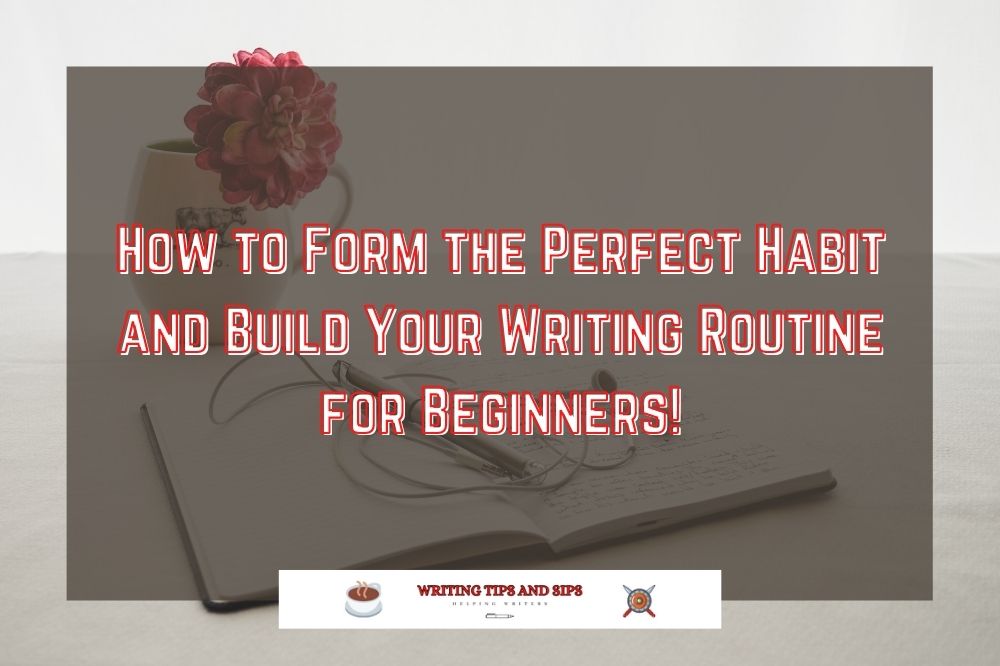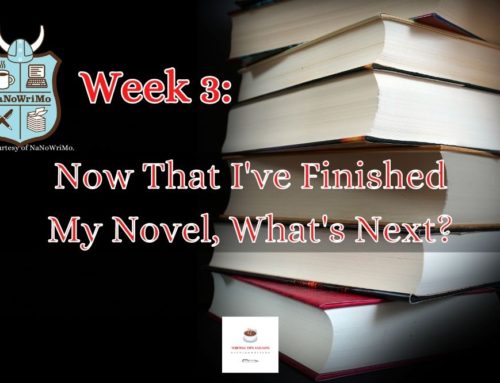*Disclaimer: This post contains affiliate links, meaning if you click on a link and make a purchase I may get a small compensation. The opinions expressed are mine alone*
National Novel Writing Month (NaNoWriMo) taught me a lot about myself and writing. It forced me to form a writing routine, and I made sure I wrote every day. I managed my goals, reached my word counts, and it opened my eyes to what it means to be a full-time writer. When I started Writing Tips and Sips, I wrote an article about the five secrets to building a writing routine, and now I return to the subject with updated information.
Many beginning writers ask themselves the question: “what is a writing routine, and do I really need one?”
When I was a young aspiring author, I believed I needed to write when I most felt inspired. However, I rarely felt inspired, and it took years to finish projects, if I would finish them at all. There would be days where I felt that something special and wrote for hours at a time getting five to six thousand words in a single sitting, and then I wouldn’t write again for months.
A writing routine counters inspiration; it forces you to get words on the page and allows you to see the end of your projects. By following your practice, you bypass feeling inspired and find the ability to paint your pages with words.
So, yes, you need one.
“But how do I start one?” I hear you ask. Simple. Set goals, find your schedule, build a habit, challenge yourself, and in no time, it will become second nature.
Goal setting:
 NaNoWriMo was the first time where I dedicated myself to sticking to a routine. It forced me to write 50k words in a single month. In my day to day writing, I write around 25k a month. That’s on a good month. Though, it made me realize the importance of having a goal to work towards.
NaNoWriMo was the first time where I dedicated myself to sticking to a routine. It forced me to write 50k words in a single month. In my day to day writing, I write around 25k a month. That’s on a good month. Though, it made me realize the importance of having a goal to work towards.
It’s hard to start a habit or routine without working toward anything. In fact, without that something to work for, you’re doomed to fail. The first step to building a writing routine then is to set a goal for yourself.
I recommend getting a writing journal to keep track of this goal. I recommend this journal because it looks cool and makes me feel like an explorer traveling the great seas of writing. Start with something simple. Like 50k words in a month. We’ll make that your big goal in which to strive.
The second step is to break that up into a daily word goal. In this case, it would be 1613 words a day. That sounds much more manageable, right?
Having small goals to work toward helps relieve the stress of managing the larger, seemingly unreachable tasks. You break it up into bite-sized portions and watch as your motivation grows as you keep hitting and exceeding your marks!
Schedule Your Time:
 Now that you have your large goal—for the case of this article—writing 50k words in a month and broken it down into small bite-sized pieces, it’s time for the third step.
Now that you have your large goal—for the case of this article—writing 50k words in a month and broken it down into small bite-sized pieces, it’s time for the third step.
I would recommend getting a planner to schedule your time to write. When participating in NaNoWriMo, I found that I was more productive at certain times of the day as opposed to others. If it were a good time, I would focus on writing and pour words onto the page like filling a glass of water. However, if it were a less productive time for me, I would struggle and slog my way through a writing session.
You must be aware of the times you are most productive. At first, try writing at different points in the day and see how you feel. I base my writing time when I feel most awake during the day, which tends to be between 4 pm-7 pm. Early in the morning, I am too tired, too late, and I rather play video games and hang out with my wife.
Trial and error are the best way to find what time works best for you. Everyone is different, and my best time could be your worst time. Once you find your golden moment, plan your writing sessions around it.
Habit-Building:
 Inspiration is useful when you’re trying to start a project. It helps create a connection to the said story that will drive you to start it. But, it is the habit that will carry you to the finish line. Most days, the inspiration will be gone. It will be hard to find your motivation to keep writing, and the easiest option is to walk away.
Inspiration is useful when you’re trying to start a project. It helps create a connection to the said story that will drive you to start it. But, it is the habit that will carry you to the finish line. Most days, the inspiration will be gone. It will be hard to find your motivation to keep writing, and the easiest option is to walk away.
However, with the proper techniques, you can force the motivation to stay and create a habit out of writing. Pre-writing rituals help me focus my mind on the task before me. They help me transition from the mindset of whatever I was doing before my writing session to a space of creativity.
I always start my writing sessions with a short 5 to 10-minute meditation. It helps me clear my mind and move to a mental space to write. I have an article on the benefits of meditation and how to meditate here.
Usually, I grab my zafu pillow, sit in the Burmese position, close my eyes, and watch my breath. Each breath allows my mind to clear, removing me from the mindset of earlier events.
When meditation isn’t enough, or I need a little warm-up. I will open my writing journal and participate in a quick writing prompt. Usually, I will vibe with music to awaken my creativity for the writing session ahead, picking a song that fits my writing project.
Challenging Yourself:
 Writing can feel like a very isolating lifestyle. Often, you are by yourself in a room typing away for hours at a time. It can be very solitary, which makes it perfect for your average introvert. However, we are people and still need human interaction. There are ways to make writing more social, and having a friend makes you much more likely to stick to your routine. On the NaNoWriMo website, they say you are three times more likely to finish a project with a friend.
Writing can feel like a very isolating lifestyle. Often, you are by yourself in a room typing away for hours at a time. It can be very solitary, which makes it perfect for your average introvert. However, we are people and still need human interaction. There are ways to make writing more social, and having a friend makes you much more likely to stick to your routine. On the NaNoWriMo website, they say you are three times more likely to finish a project with a friend.
I love to do writing sprints on mywriteclub. It allows you to write with other people and see how you compare with others participating in the sprint at the same time. You can see how many words everyone else has written. You can chat with the community as well, which is neat, but I haven’t used the feature myself. The competition helps me when I need extra motivation for a day of writing.
You can often find a writing community within the area you live in. Sometimes, they will host write-ins. This is a great way to add a social component to your writing routine and help you get a change of pace from your normal routine. During these times of COVID 19, you can find virtual write-ins, so you don’t even have to leave your home!
The NaNoWriMo website is a great place to start in finding these resources, and they help immensely in maintaining your writing routine.
Conclusion:
A writing routine beats inspiration 100% of the time. It helps you finish your projects and gets you one step closer to reaching that goal of becoming a full-time writer. The first step is to write!
Now I hear you asking, “what happens after you reach your big goal?” Celebrate! You reached your goal. Buy yourself a fancy dinner, treat yourself! You deserve it! But, don’t let that be the end of your writing routine. Start a new project. Make a new goal. And keep striving to improve your writing.
A writing routine never ends; you just write more stories and start more projects. It keeps going, and you keep improving, and it gets easier and easier.
Let me know what you think in the comments below. Have you started any new projects lately?
C. D. Baron
Latest posts by C. D. Baron (see all)
- What is The Novella? Why You Must Write One to Improve Your Skills! - 03/21/2021
- Wake Up! A Short Story (Work in Progress) - 02/07/2021
- My Top 5 Favorite Reads of All Time (So Far) - 01/24/2021





